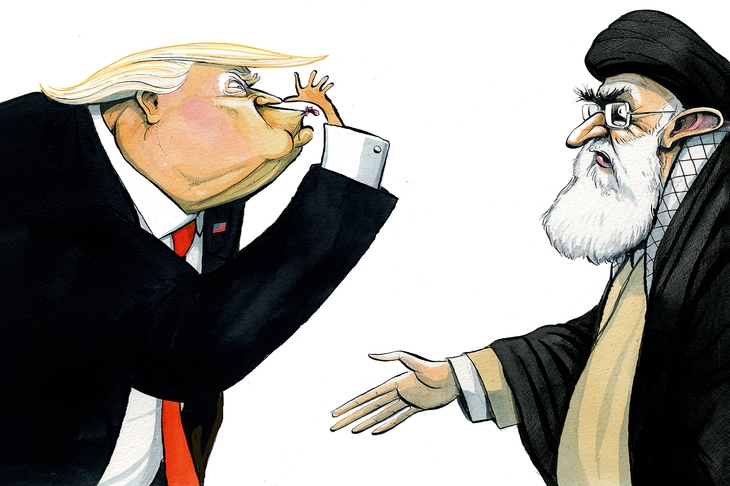What comes after the end of the Iran nuclear deal? Is Donald Trump an expert diplomat worthy of a Nobel Peace Prize, or a maniac let loose? Why don’t ethical millennials care about the moral cost of their drug habits? And are emojis ruining children’s abilities to communicate? Find out about all this and more in this week’s Spectator Podcast.
On Tuesday, President Trump announced his decision to take the US out of the Iran nuclear deal. The decision has come despite appeals from Angela Merkel, Emmanuel Macron, and even our own Boris Johnson, for the US to stay in the deal. Christopher de Bellaigue writes in this week’s magazine that this was a gross miscalculation, but Dominic Green can understand why Trump did it. Christopher joins the podcast, along with Dr Roham Alvandi, Professor at the LSE and author of Nixon, Kissinger, and the Shah: The United States and Iran in the Cold War. Roham says:
‘I think it’s unambiguous that the policy of the Trump administration, very much driven by John Bolton but also by Pompeo and others is one of regime change.’
And why don’t ethical fairtrade-buying, avocado-eating millennials care about the moral footprint of their drug usage? In this week’s magazine, Alastair Thomas argues that the rise in gang-related violence in London is driven by higher cocaine usage by the middle class young in London. So why don’t his trendy metropolitan friends care about contributing to the human and environmental cost of cocaine, and continue to dabble in it at parties and clubs? Alastair joins the podcast, together with Dr Adam Winstock, head of the Global Drug Survey. Alastair explains the disconnect between well-off users and rough suppliers:
‘If you are white and middle-class, you are sheltered from the estates where most of those drugs change hands, even in London.’
As children grow up surrounded by social media, Laura Freeman worries that the use of ‘emojis’ – those small digital images used in texts and online messaging, such as a smiley face – are making children less able to express themselves with words. Laura argues that the reliance on expression through emojis means that the same children struggle with words in school and beyond. Professor Vyv Evans, a linguistics expert and author of The Emoji Code, and Lara Prendergast, The Spectator’s Assistant Editor, discuss. Vyv believes that emojis actually make us better digital communicators:
‘Someone can seem to be shouting at us when we get these abbreviated texts, emails, and so on. People come across as raving lunatics sometimes…and this is where emoji comes into its own. It puts back the empathy, the emotion, and helps us nuance what we actually want our addressees to understand.’
So is Iran’s regime about to fall, or cocaine the new class divider? And what do you think of emojis? We’d love to hear from you – rate and review the podcast on iTunes, or let us know via Twitter.
To subscribe to this podcast and many more, visit the iTunes store.








Comments